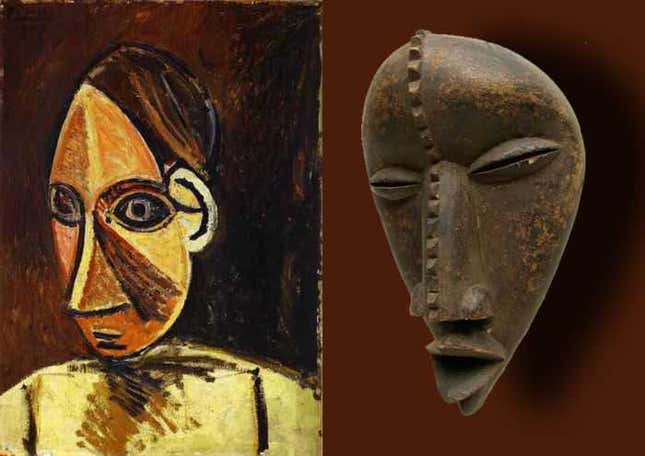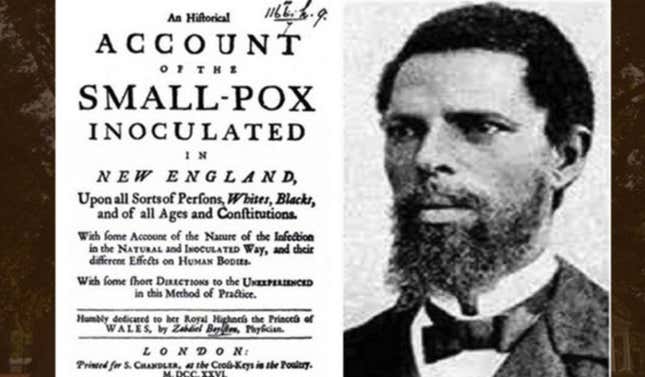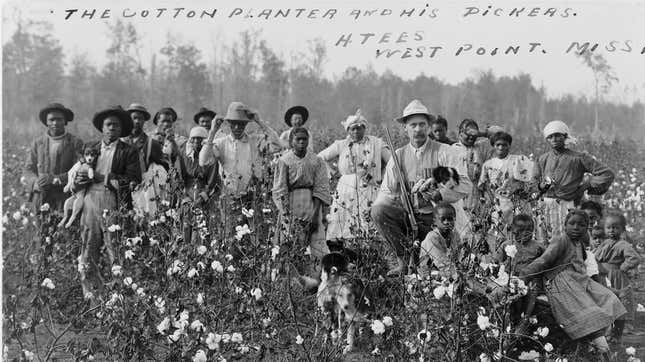
Netflix’s new documentary, The Lion’s Share, chronicles the history of the song “The Lion Sleeps Tonight,” how it became a worldwide hit and—most importantly—how media companies including Disney, kept the song’s original creator, South African musician Solomon Linda, from receiving any of the profits.
While discussing the film, someone on The Root’s staff pondered if—considering the millions of dollars generated by this song over the span of eight decades— “The Lion Sleeps Tonight” was the most heinous incident of cultural theft in history. The question piqued our interest, which led to this ranking of what I consider to be the worst cultural thefts of all time.
This list was not voted on by a panel of wypipologists or vetted by the American Consortium of Caucasians Be Stealing. Instead of broad categories like the blues, jazz or Kardashian-ing (a verb that combines cultural appropriation and desperation for fame—also known as “Ariana Grandestanding”), we (meaning “I”) chose specific examples that met the following criteria:
- Something was created by a black person or black people.
- A white person or white people took it without permission.
- The white person benefitted or profited.
- The people who created the thing never shared in the recognition, accolades or financial benefit.
While this is different from cultural appropriation, this list is indicative of how American culture has not only sucked the creative marrow out of the bones of black culture, it also shows how white America will manipulate laws, whitewash history and twist white supremacy into an underhanded narrative that makes the world believe that black people are the ones who steal because white people are too busy being great.
Thieving motherf ...
But I digress.
10. Pablo Picasso stole African art.

African art experts have long acknowledged that, of all the European masters, Pablo Picasso’s life’s work straddled the line between influenced by and outright theft. Art historians and researchers called it “cultural appropriation,” (pdf) while Africans called it theft. Picasso said: “Good artists copy, great artists steal.”
In 2006, a Johannesburg gallery hosted the largest exhibition of Picasso’s work ever displayed in South Africa. To show his legacy, the gallery also included the work of the African artists who inspired Picasso. South African Department of Arts and Culture spokesman Sandile Memele said of the exhibit: “Today the truth is on display that Picasso would not have been the renowned creative genius he was if he did not steal and re-adapt the work of ‘anonymous (African) artists.’”
It is unquestionable that there was a period in Picasso’s career where the famed artist was simply painting African artifacts. Whether Picasso stole African art or was inspired by it is up for debate, so some might not consider his work to be cultural theft. What is not up for debate is one of Picasso’s most famous quotes: “L’art negre? Connais pas.”
The sentence roughly translates as: “African art? Never heard of it.”
9. Friends is Living Single with mayonnaise.
Everyone on the internet knows that the hit NBC sitcom Friends is an unmelanated version of Living Single. None of the show’s creators will openly admit it, even though Living Single was created a year earlier than NBC’s Caucasian version. But the internet knows.
Also, when Yvette Lee Bowser created Living Single for Warner Bros. in 1994, one of the suggested titles for the show was Friends. A year later, Friends (or as I call it “White People Don’t Knock”) debuted on NBC, but I’m sure it was a coincidence. Both shows aired on Thursday nights but Living Single ended after six seasons while Friends went on to become one of the most successful shows in TV history, maybe because the black sitcom never got the same promotion as the white version from the studio.
Both shows were produced by Warner Bros.
8. Led Zeppelin stole the “greatest guitar riff of all time.”
Led Zeppelin is one of the greatest cultural thief crews of all time, having been sued for stealing almost every hit they ever made. Most of their songs were cribbed from blues artists, but perhaps none as blatantly as “Whole Lotta Love.” In 2004, the song was ranked No. 75 on Rolling Stone magazine’s list of the 500 Greatest Songs of All Time. In 2014, listeners to BBC Radio voted “Whole Lotta Love” as containing the greatest guitar riff of all time.
They stole that shit.
Willie Dixon, who wrote “You Need Love” with Muddy Waters, sued Led Zeppelin and the group settled out of court. When asked about it, Robert Plant would later say:
“I just thought, ‘Well, what am I going to sing?’ That was it, a nick. Now happily paid for. At the time, there was a lot of conversation about what to do. It was decided that it was so far away in time and influence that … Well, you only get caught when you’re successful. That’s the game.”
Muddy Waters died two years earlier.
7. Charlie Case
While we said we wouldn’t do broad categories, this list could easily be composed of black entertainers whose vaudeville and nightclub acts were unabashedly stolen by white performers. But perhaps none of these cases are as important as the story of Charlie Case.
Charlie Case was a famous vaudeville comedian. He sang. He wrote songs. In the 1920s, white comedians who saw him simply took his jokes and his songs and started performing them for white audiences. W.C. Fields’ entire act was Charlie Cases’. The above clip is from the 1933 film, The Fatal Glass of Beer, an entire film based on a song written by Case.
But none of that shit matters.
Case was robbed of his intellectual property because—aside from his songs—he was one of the funniest people who ever lived. In fact, in the 1880s, Charlie Case commanded large audiences in nightclubs and theaters doing something that no entertainer had ever done, according to numerous showbiz historians, including Eddie Tafoya’s The Legacy of Wisecrack.
Case didn’t dance. He didn’t wear costumes or blackface. He didn’t even use props. He simply stood on stage and made people laugh. It is remarkable that he is not a household name because of one generally accepted historical fact that almost no one disputes:
Charlie Case was the first stand-up comedian.
6. Elvis Presley ain’t nothing but a Hound Dog.
One of the weirdest things about the list of black musicians whose songs were stolen without payment is that white artists rarely chose obscure songs. If a black artist had a reasonable hit, white artists would just take the song, record it and perform it as their own.
This information is important to know because Elvis Presley technically didn’t steal “Hound Dog” from blues legend Willie Mae “Big Mama” Thornton. When Thornton recorded the song in August 1952, the song immediately became a No. 1 hit. On Sept. 9, 1952, Thornton even filed for a copyright application for the song.
Then, everyone started stealing it.
But it was Elvis—who stole it from Freddie Bell and the Bellboys, who stole it from Little Esther, who stole it from Thornton—who made the song one of the most recognizable songs in rock ’n roll history. But despite her copyright claim, the song (which is one of the most litigated songs in history) is credited to the white men who paid for the recording session.
All told, Big Mama Thornton earned $500 for recording “Hound Dog.”
5. Every form of American dance
Every single form of American dance was created by African Americans. Of course, European dances like the Tango and Waltz were popular in the United States, but they are not American.
I know, I know, I said the list would be specific and not broad so I’ll narrow this down just to:
Swing dancing, the Lindy Hop, the Charleston, the jitterbug, the flea, the mover, the spin, the buzz, the jazz, the Cab Calloway, tap dancing, the moonwalk, the slide, the skirt, jukeing, flapping, shagging, jive, boogie woogie, the rock, the mashed potato, the twist, the James Brown, the robot, the squirt, the monkey, the funky chicken, the schoolboy, hand jive, disco, popping, locking, breakdancing, the worm, the windmill, the King Tut, the Vogue, the Bobby Brown, the Michael Jackson, the Tootsie Roll, the Butterfly, the Electric Slide, the Wobble, the Cupid Shuffle, jukking, line dancing, square dancing, crumping, twerking and shaking that ass like a saltshaker.
4. Chuck Berry’s entire career
Chuck Berry may be the most stolen-from artist in music history. Here is a partial list of songs stolen from the blues icon:
- The Beatles’ “Come Together”
- The Beach Boys “Surfin’ USA”
- Elvis Presley’s “Jailhouse Rock”
- The Rolling Stones’ full catalog
- The Beatles’ “I Saw Her Standing There”
But unlike many on this list, Chuck Berry did not die in poverty. He secured the bag, leaving an estate worth an estimated $50 million. But if Chuck Berry received his true payment, he could buy white people.
All of them.
3. Jack Daniels’ whiskey
For a century and a half, Jack Daniels epitomized American liquors with its origin story about the Tennessee whiskey distiller who cemented his legacy by creating an iconic brand with nothing but the sweat of his brow and hard work and ... hold on. Please excuse me while I guffaw.
You know white people don’t do that.
Nah, Jack Daniels learned how to make whiskey from Nearest Green, a slave who was the family’s master distiller and the first African-American master in the United States. So it was nice that the Daniels family finally came clean a scant 150 years after it took Green’s recipe and erased him from history. But I bet everything will be repaired now that Jack Daniels’ heirs are worth $20 billion, making the clan one of the richest families in America.
I’m sure they are in favor of reparations.
2. How Onesimus saved America

In 1716, Onesimus, an enslaved African purchased by notable Puritan minister Cotton Mather, told his master an incredible story. Mather already thought Onesimus was “wicked” and “thievish” because of the slave’s intelligence. Maybe it was because the slave still practiced African traditions. Maybe it was the smallpox epidemic that was killing thousands. At any rate, Cotton Mather didn’t trust Onesimus, especially when the slave told Mather something that was impossible to believe:
He knew how to cure smallpox.
Onesimus showed him a scar on his arm and said he had undergone surgery in Africa that made him immune to smallpox. He told Mather to cut himself and rub the puss from a smallpox sore into the cut, and that would make him immune. Mather finally believed Onesimus and started telling doctors everywhere, even sending letters abroad, but American medical professionals thought Mather was out of his mind. A few people in China and the Ottoman Empire had heard of this, but it wasn’t reliable white people medicine.
Then in 1721, smallpox killed 14 percent of Boston’s population. Mather convinced a doctor friend to try Onesimus’ method, inoculating his slaves, his family and friends. That year, one out of every seven people in Boston died from smallpox.
Of the 242 people inoculated by Mather’s friend, only six died—or one in 40.
The news spread around the world and for the first time, American doctors had evidence-based tests to show that live vaccines can provide immunity. Eventually, the smallpox vaccine became mandatory in Massachusetts. In 1980, the World Health Organization declared that smallpox to be the first disease ever wiped out by modern medicine.
Edward Jenner, who developed a smallpox vaccine 80 years after Onesimus, is called the “Father of Immunology” and is widely credited with the discovery of the smallpox vaccine. Very few people know Onesimus’ name.
Having saved Mather’s family, Onesimus tried to purchase his freedom from Mather shortly after the smallpox epidemic passed. Onesimus even offered to buy another enslaved person to replace him.
Mather refused.
1. America

Stop me if you’ve heard this one.
Stolen Africans were taken to a country stolen from Native Americans and had their labor stolen from them for 400 years, making the country the wealthiest place on earth. Eventually, a war between keep-the-country-together thieves and pro-slavery thieves set the stolen people free ...
But not really.
Instead of stealing labor, the thief country stole our dignity, our history, culture, humanity and even our lives. And for all this, we were allowed to live in cages on the worst parts of the stolen place. Soon, the dignity thieves lost to the dignified thieves and instead of Jim Crow, the thieves created crack cocaine, shipped it into black neighborhoods, made it cheaper than regular cocaine and created a War on Drugs to steal freedom, time and lives from the crack-adjacent communities that didn’t have guns, planes or boats to import cocaine.
Over this time, they devised plans to steal votes, music, art, culture, money, neighborhoods, ideas and blood. There is always blood.
Always.
And they will tell you this is normal. They will call it “nation-building.” Or “manifest destiny.” Or “inspiration.” Or “influence.” Or ...
“The American Way.”

